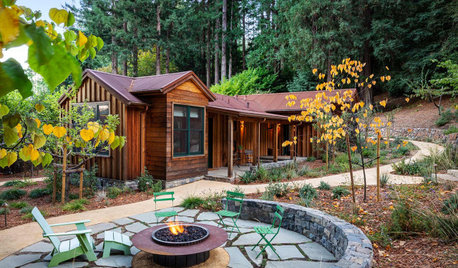soybean meal and Round-Up
paulinct
16 years ago
Related Stories

DINING ROOMSFreshen Up Your Dining Room to Savor Meals More
If drive-through dining or a TV companion is your daily deal, you might just need a dining room worth spending unhurried time in
Full Story
ENTERTAININGGot Hand-Me-Down Dinnerware? Make a Memorable Meal
They might be mismatched and not your style, but those inherited plates and forks can help bring meaning to your table
Full Story
HOMES AROUND THE WORLDTraditional Kitchen Opens Up and Lightens Up
Removing a wall was key to creating a large kitchen and dining space for family life in this London house
Full Story
FALL GARDENING7 Reasons Not to Clean Up Your Fall Garden
Before you pluck and rake, consider wildlife, the health of your plants and your own right to relax
Full Story
PATIO OF THE WEEKYear-Round Gazebo Glory in Toronto
Lilacs in spring, snuggly blankets in winter. With weatherproof panels and seats aplenty, this gazebo is guest ready all year long
Full Story
COLOR10 Great Places for Rich Fall Colors Year-Round
Use nature’s burgundies, golds and oranges in these select spots for a comforting feel no matter what the season
Full Story
FURNITUREUse Wicker and Rattan for a Tropical Flavor All Year Round
Find out more about what separates — and unites — these classic materials
Full Story
LIFELate Again? Eliminate the Things Holding You Up in the Morning
If you find yourself constantly running late for appointments, work and get-togethers, these tips could help
Full StorySponsored








mistersubliminal
paulinctOriginal Author
Related Professionals
Arlington Landscape Architects & Landscape Designers · Hyattsville Landscape Architects & Landscape Designers · Boca Raton Landscape Contractors · McLean Landscape Contractors · Ronkonkoma Landscape Contractors · San Antonio Landscape Contractors · West Palm Beach Landscape Contractors · La Verne Swimming Pool Builders · Berkeley Fence Contractors · Berkeley Fence Contractors · Centennial Fence Contractors · Cherry Hill Fence Contractors · Eagle Mountain Fence Contractors · Hull Fence Contractors · Winnetka Fence Contractorsdoopstr
paulinctOriginal Author
iowa50126
paulinctOriginal Author
doopstr
paulinctOriginal Author
dchall_san_antonio
paulinctOriginal Author
paulinctOriginal Author
paulinctOriginal Author
lou_spicewood_tx
paulinctOriginal Author
decklap
paulinctOriginal Author
decklap
ronalawn82
ronalawn82
texas_weed
decklap
texas_weed
dchall_san_antonio
morpheuspa (6B/7A, E. PA)